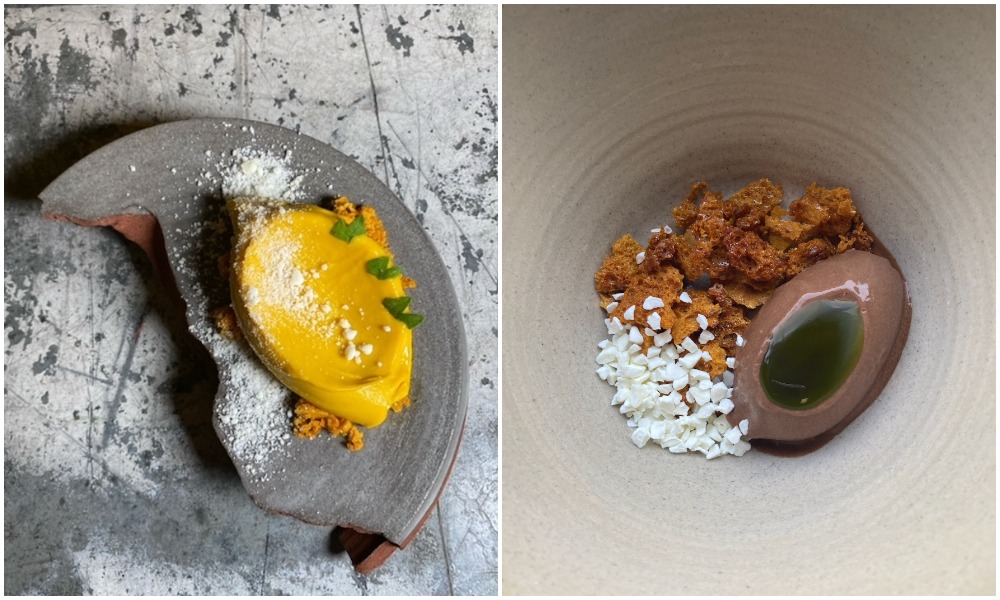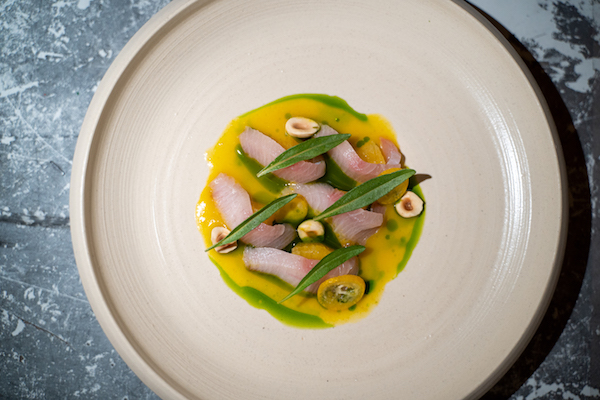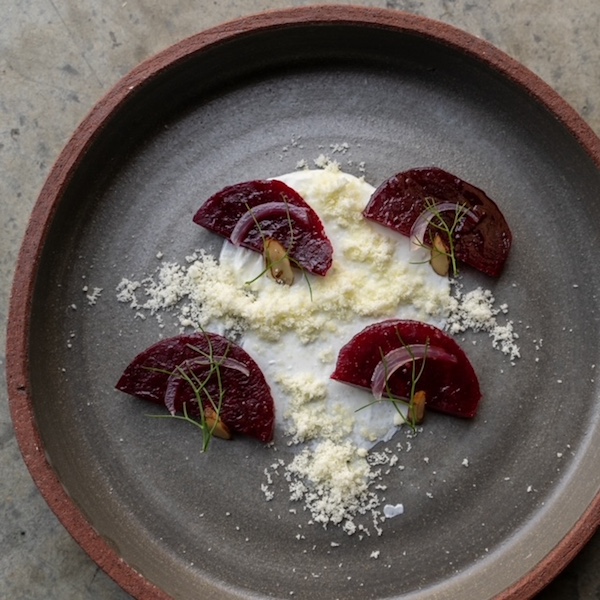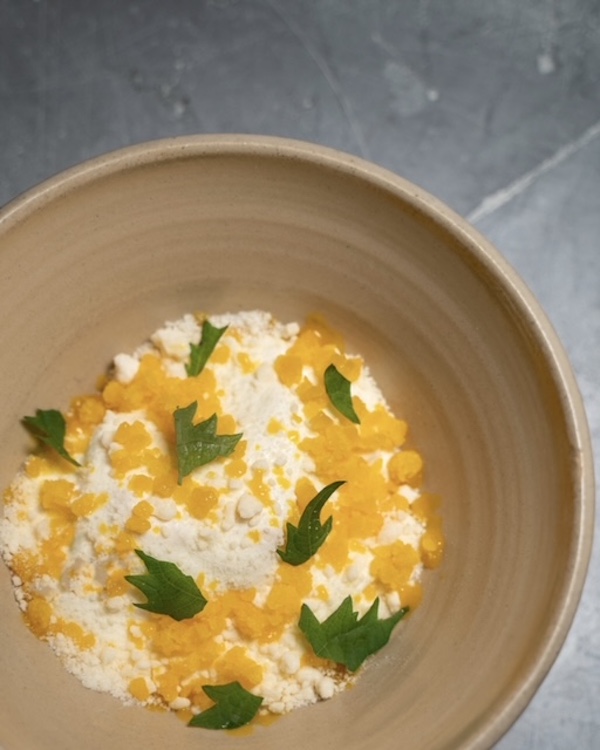DUBAI: Smoked shishito hummus? Check. Cured hamachi, mandarin and zaatar? Check. With these fusion dishes and many more in the offing, a young French-Syrian chef, who has led one of the most successful restaurants in Dubai, is raring to go down the revolutionary road as far as cooking is concerned.
Using local regional products such as dukka (a nut and spice mix), zaatar (based on thyme) and muhammara (a dip made mainly of red peppers), and ingredients such as shishito (another type of pepper) and hamachi (a Japanese fish), 24-year-old Solemann Haddad is shaping the offering in his hometown.
His goal is to meld traditional ingredients with modern techniques.
Born and raised in the UAE, Haddad’s passion for cooking started when he was only 4 years old, when he would steal his brother’s cookbook and lock himself in the kitchen to bake cookies and omelets with his mother’s help.
“That was my first-ever memory with food,” he told Arab News. “It was like making potions, with a different outcome every time. I found that very interesting as a kid.”

The path to realizing his ambitions has not been easy. After studying international relations in university, he found himself frustrated and lacking direction.
“I did not enjoy university at all, although I had good grades,” Haddad said. “I had panic attacks every night.”
Conversations with his father about his future profession in cooking led to dead ends. “My dad, and many Arab men from his generation, would question the idea of a man becoming a chef,” he said. “The idea of being a chef was so far-fetched to him, but it has more to do with the old-school culture.”
Still, Haddad was not ready to give up on his calling. One day, four weeks before his final university exams, he made the jump. He took money from his father and got on the first flight to London, where he stayed at a friend’s house. “I told my father I wouldn’t come back until he accepted the fact that I was going to be a chef,” he said.
“So, there was an unspoken agreement: He would send me to culinary school, and I’d come back and finish university. And that’s what I did.”

Haddad attended two cordon bleu culinary schools in Japan and London over a period of 10 months, while juggling internships at Michelin-starred restaurants. After returning to Dubai, he completed university in 2019 and started consulting for restaurants on the side, providing advice on menus and ingredients.
It was while working at a Michelin-starred restaurant in London, where he tasted every dish to further his learning curve, that he had an epiphany. “I tasted something with mushrooms and thought to myself, ‘I never thought food could taste this good’,” Haddad said.
“It’s like I was seeing a new color. Then I realized the possibilities. My eyes opened, and it changed my life. It was the most impactful moment in my schooling years.”
Back in Dubai, Haddad started working as sous-chef at Inked, a self-described food and music cooperative, for a few months. During his time at the restaurant, he created and served 25 new menu items a month. Then in March last year he was let go due to the COVID-19 pandemic.
Lockdown soon followed, with six months of forced rest. “I didn’t even crack an egg,” he said. “I took a vacation because I had been working intensely for three years, so it forced me to relax.”
THENUMBER
$136,000-340,000 - Average cost of opening a small, independent restaurant in Dubai.
The downtime proved beneficial, as the young chef soon started broadcasting homemade videos on Instagram Live and developing recipes for fun. For him, it was much-needed research and development.
His cooking is decidedly high end and shows an obsessive attention to detail and technique derived from Haddad’s experiences in Japan, roots in Lebanon and Syria’s proud culinary traditions, and influences from India. Is this fusion personified?
"I always say my life is fusion because I'm just cooking what I grew up eating. My mother was French, so I used to eat French food, but I would also eat shawarma with my father, and Syrian/Lebanese food with my grandmother,” Haddad said.
“My life has been centered on having no fixed cuisine so the way the dishes come out is organic and it's what makes sense to me.”

His next break came when Rami Farook, the owner of Maisan15, a restaurant and gallery, suggested they form a partnership to open a restaurant in an art gallery in Dubai’s hip Alserkal Avenue.
“There was neither a kitchen nor gas. I thought it was a bit crazy, but the more I thought about it, the more I saw it as an opportunity and, within a few hours, I was convinced,” Haddad said.
In 30 days, a kitchen was built from scratch, and Warehouse16 was launched in mid-September 2020.
“Everything was smooth sailing, and we were doing very well,” he said. “We were fully booked from the first to the last dinner.”
At the restaurant, Haddad combined dishes based on Japanese kaiseki — a formal, traditional multi-course Japanese dinner — with local Middle Eastern ingredients. He credits Misbah Chowdhury, a childhood friend and partner at Warehouse16, who is also its operations and social-media marketing manager, with making the venture a success.
“We were always very aggressive on sales and social media,” Haddad said. “Many restaurants leave things to fate, but this helped us out a lot in the beginning when we didn’t have a fan base.”

Haddad says he is meticulous in both cooking and presentation. He will serve a dish only if it both looks and tastes good, dedicating therefore 51 percent of his effort to flavor and 49 percent to plating. The results are dishes of artistic beauty.
“The visual aspects and the flavor are almost as important as each other,” he told Arab News.
Such a mindset translated into a surge in success. Warehouse16 generated more than a year’s planned revenue in half that time. “It exploded in five months,” Haddad said. “We were very humbled and pleasantly surprised.”
Despite its economic ups and downs, Dubai is home to a lot of prosperous people with money to spend. A meal chez Haddad is likely to come in at Dh400 to Dh500 a head, and that can include a seven-course tasting menu.
Since that successful opening, however, the pandemic has intervened. The restaurant has had to shut down due to license complications arising from new COVID-19 regulations. In the meantime, Haddad is conducting a number of pop-ups across Dubai.
“The goal for me is to either open the best restaurant in the world in Dubai or die trying,” he said. “There’s no middle ground.”
He speaks of many in the industry who wrongly believe Dubai’s food scene solely focuses on franchising international concepts, expressing no faith in the city they operate in.
“There’s so much potential (in Dubai) because the food scene doesn’t exist yet. It’s developing, so now’s the time to put your chips in. The market is so young.”
-------------------
Twitter: @CalineMalek






























